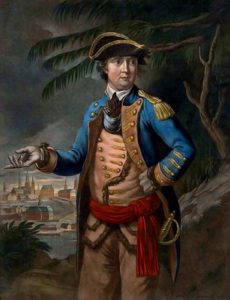Benedict Arnold was born in Norwich, Ct on January 14, 1741. He and his sister Hannah were the only two of six siblings not to succumb to yellow fever during their childhood years. Overcome with the grief with the loss of his children, his father, a once successful businessman and grandson of a once governor of Rhode Island gradually descended into alcoholism and plunged the family into dire financial straits.
After seven years of apprenticeship at an apothecary in Norwich, young Benedict Arnold opened his own apothecary in New Haven and through hard work built a lucrative business. Profits from his business allowed him to purchase three ships and establish himself as merchant in the West Indies trade. Like many other colonial merchants, Arnold resented the taxes levied by England on commercial trade through the Stamp Act (1764) and Sugar Act (1765). He became an ardent member of the Sons of Liberty, and in the years that followed was further radicalized by events such as the Boston Massacre in 1770.
The Revolutionary War began in 1775. Owing to his obvious leadership qualities Arnold was given the rank of captain. He proposed an attack on Fort Ticonderoga in upstate New York. Under his leadership, the Connecticut militia joined forces with Ethan Allen’s group of patriots to capture the British held fort. This was the beginning of a meteoric military career for the man that George Washington would eventually call “his fighting general”. Promoted to the rank of colonel, his next expedition was an attack on Quebec City in 1776 and then overseeing the construction of a Colonial fleet of ships to defend Lake Champlain from the British.
Perhaps his greatest achievement came as a brigadier general during the Saratoga campaign in 1777 where he distinguished himself in two battles against the British in upstate New York. It was during the second battle that he badly reinjured his left leg.
Despite his many military achievements, Arnold had amassed many political enemies in Congress who collectively deferred his promotion to the rank of major general, a position that both he and General Washington felt he had earned. His leg injury prevented him from taking another field command position, so he was appointed military governor of Philadelphia by General Washington in June of 1778. His anger over his thwarted professional ambitions coupled with his subsequent marriage to Peggy Shippen in 1779, a member of a loyalist family in Philadelphia marked the beginning of his downward arc from hero to traitor.
In the early months of 1779 began secretly contacting British generals and providing information on General Washington’s troop movements. Arnold was appointed the commander of West Point in 1780. He in turn offered to surrender the fort to the enemy in exchange for a large sum of money. The plot was foiled when British Major Andre, the recipient of the strategic documents was captured.
Arnold escaped to England where he was granted the rank of brigadier general, returning to the colonies in December 1780 to have the British troops under his command pillage Richmond, Virginia. He then on September 4th 1781 infamously ordered his troops to burn most of the city of New London to the ground. An act which would forever make his name synonymous with the word traitor.
To see paintings and caricatures of Benedict Arnold as both American hero and traitor visit the Otis Library’s Flickr site for historical images.

